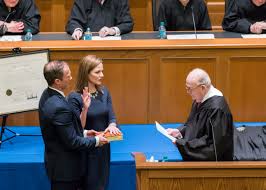Written by Devon Mitchell
The Senate confirmed Donald Trump’s third Supreme Court nominee, Amy Coney Barrett, on October 26th with a 52-48 vote along party lines. Barrett’s confirmation gave the already conservative leaning bench a stronger majority. The court now stands with a 6-3 conservative majority.
Barrett’s nomination and confirmation quickly became a contentious hot topic. Barrett being nominated only a month and a half before the election, Democrats found hypocrisy in the Republicans’ push to get her through to the Supreme Court. Four years prior, Barack Obama faced a similar situation which Trump has found himself in presently. It’s an election year and there is a vacant seat on the nation’s highest court. The only difference is Obama couldn’t get his nominee through eight months before the election due to Republican opposition. Back in 2016, Republicans such as South Carolina Senator Lindsey Graham argued against confirming any nominees during an election year.
Graham was quoted saying, “I want you to use my words against me. If there’s a Republican president in 2016 and a vacancy occurs in the last year of the first term, you can say Lindsey Graham said, ‘Let’s let the next president, whoever it might be, make that nomination,’ ”
Senator Graham, who is also the chair of the Senate Judiciary Committee that oversaw Amy Coney Barrett’s confirmation, did not have the same viewpoint as he did in 2016. In 2020, Graham viewed the situation as different because now there is a Republican controlled White House and Senate.
Despite contradictions and rhetoric, Barrett was still confirmed. Now, Democrats are anxious about what a conservative majority court will look like. One major fear which will be coming to light soon is reproductive rights. Barrett has spoken in the past about how she dislikes abortion rights and is thought to likely to vote to uphold restrictions. A ban on abortions after 15-weeks in Mississippi is waiting to be reviewed by the justices. This could be Barrett’s first opportunity to show American’s her constitutional stance on reproductive rights. Besides cases concerning Roe v. Wade, Griswold v. Connecticut is also in danger. Should cases come forward to the Supreme Court, Barrett could vote against the right to birth control.
An additional fear should Roe or Griswold be overturned is that the court would recognize “fetal personhood”, which essentially means a fetus has constitutional rights at conception. However, over a decade ago voters voted against personhood amendments. The fear was that because personhood would be confirmed at conception, this would include a ban on the morning after pill and certain types of birth control.
Additionally, supporters of LGBTQ rights are fearful of Justice Amy Coney Barrett. During her confirmation hearing, Barrett refused to answer if she thought Obergefell v. Hodges (the 2015 ruling on same-sex marriage) and Lawrence v. Texas (decriminalizing same-sex intimacy) was the correctly decided. Throughout her hearing, Barett dodged questions on LGBTQ rights and if she would protect those rights which have already been ruled on.
Barrett will have an opportunity to show Americans how she really plans on voting on such cases. The day after the election (disclaimer: this article was written on Tuesday November 3rd) the Court will hear Fulton v. City of Philidelphia, a case concerning the city of Philidelphia terminating a contract with a Catholic Social Service Program because they refuse to accept foster parent applications from same-sex marriages. This ruling will concern both religious rights and anti-discrimination laws, two hot topics during Barrett’s hearing.
Although no one can tell exactly how Amy Coney Barrett will rule on these important cases, it is still nerve wracking for Democrats and supporters of equal rights. Barrett’s confirmation was a statement from President Trump in establishing a Trump era legacy. Being only 48 years old, Barrett has her whole career as a justice ahead of her. Based on what was seen during her hearing, speculation leads Americans to believe she will rule with a firm hand on her beliefs.




